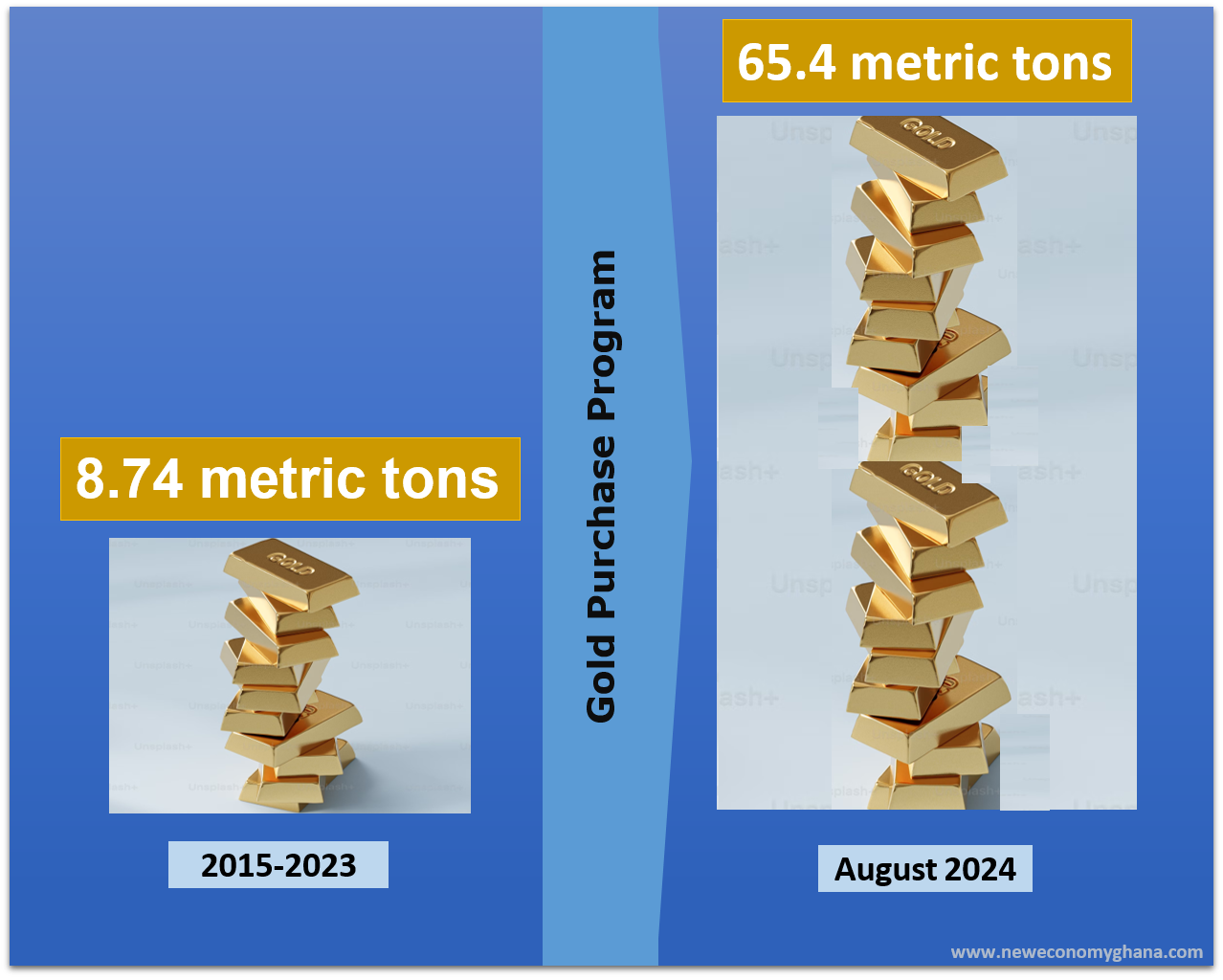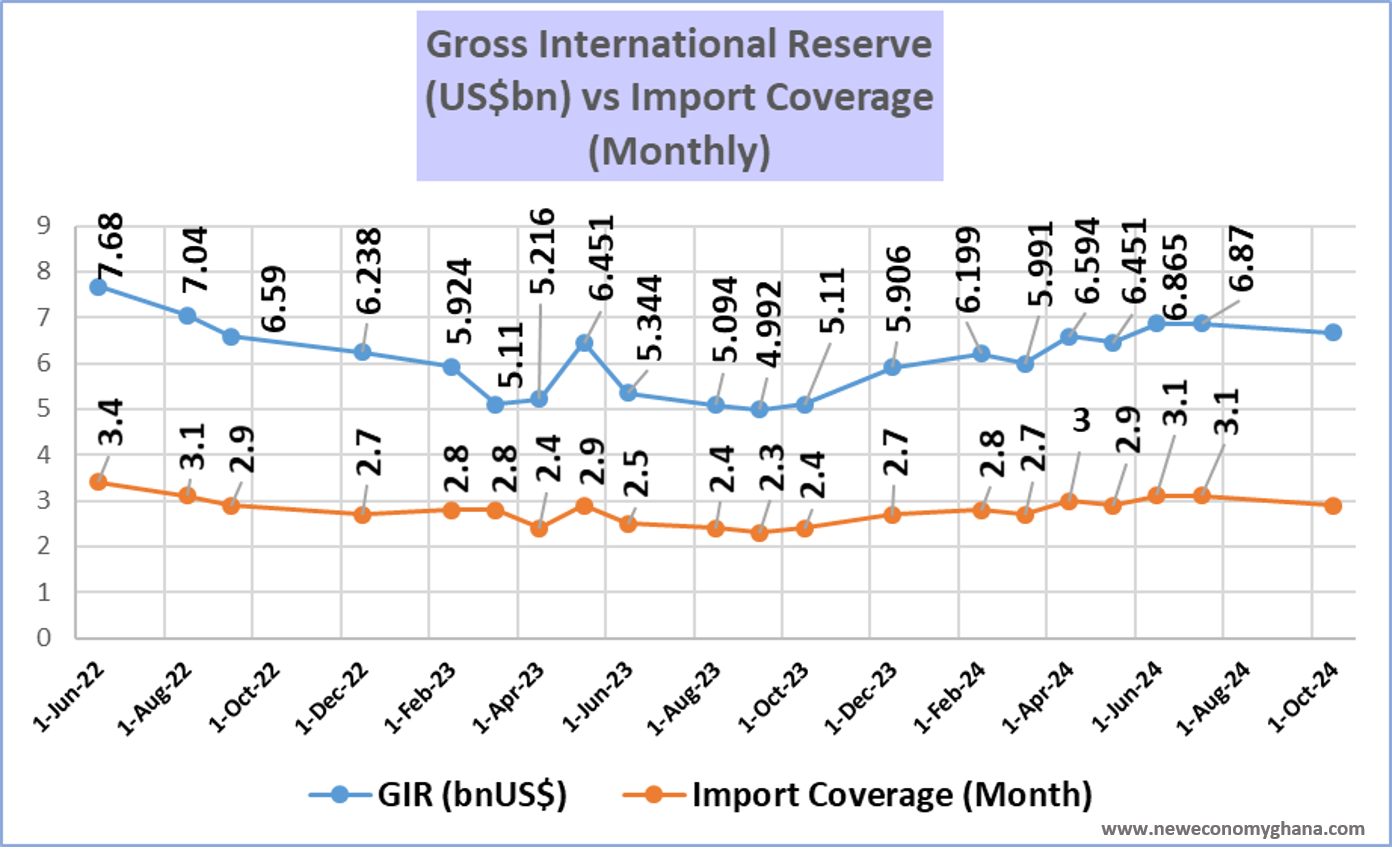How the 2022 Domestic Gold Purchase Program increased reserves
Adam Lamptey, Accra, Ghana
June 2, 2024
B etween 2019 and 2022, external shocks exacerbated Ghana’s pre-existing fiscal and debt vulnerabilities. In September 2022, Ghana defaulted on its sovereign debt and lost access to the international market. This economic turbulence led to a decrease in the country's international reserves, Cedi depreciation, rising inflation and plummeting domestic investor confidence. Moreover, Ghana’s dependency on imports of essential goods and manufacturing inputs means that country constantly need international currencies for international trade settlements.
Rationale for the program
On May 17th, 2022, The Bank of Ghana unveiled a program to purchase gold from domestic producers. The Bank called the program the Domestic Gold Purchase Program (DGPP). It involved the purchase of gold in Ghana Cedi (GH₵), through a designated national aggregator. An agreement with mining companies entitled the BoG to buy 20 percent of their refined gold. The Bank selected Asanska Minerals Ltd (the aggregator) to deliver the gold purchased from the small-scale gold producers to the State's assayer, the Precious Minerals Marketing Company (PMMC).
This special operations had three goals: preserve and increase reserves, ease the pressure on the cedi and curb galloping inflation.
Importance of the mining sector
The contribution of the mining sub-sector to the national gross domestic product (GDP) was 7.8 percent in 2020 (7.6 percent in 2019). Ghana is the largest gold producer in Africa and ranks seventh in the World. Data from the Ministry of for Lands and Natural Resources indicate that mining activities exist in all the sixteen (16) regions, providing direct and indirect jobs to some three million (3,000,000) people in 2023.
In 2022, gold exports generated US$6.6 billion in revenue, making it the country's highest-earning mineral export. The country produced 90 tons (2023), 88 tons (2022) and 142 metric tons in 2019. The same year, diamond for example generated US$3.9 billion in revenue to the country.
Twelve large scale gold mining companies operate in the country. They employed 34,363 people in 2020. Informal and illegal small scale gold mining operations are endemic throughout the country and provides temporary employment to millions of people.
Ghana has limited gold processing facilities and must therefore export a large proportion of its gold production. Before the DGPP and despite its vast gold reserves and substantial annual production, the country’s gold reserves was stagnating, relative to that of peer country South Africa. In 2020, South Africa, second producer of gold after Ghana had 125 tons of gold reserves, compared Ghana with 8.4 tons during the same period (Before the gold purchase program).
Results of the DGPP
During the DGPP, gold reserves increased from 8 to 14 tons at the end of the 2022. By the end of the fiscal year 2023, the BoG had purchased a total amount of 17.89 tons (US$1,140m) of gold to boost its gold reserves. At the end of April 2024, the Bank of Ghana had a strong liquid monetary gold levels of over 26.6 tons (estimated at US$2.1 billion) 1. On August 08, 2024, Ernest Eddison, Governor of the Bank of Ghana announed that ‟since inception of the Domestic gold purchase programme, the Bank of Ghana has bought 65.4 tons of gold, valued at US$5.07 billion.”2
Back in November 2022, the government of Ghana had launched another program, with the goal of curbing inflation. The Gold for Oil (G4O) program also aimed to stem the draining of the country’s foreign reserves. Under the program, the government paid for refined petroleum products with gold. The purchase involved barter trade, where Ghana exchanged gold for oil.
The combination of these two nation programs (DGPP and G4O) contributed to a fall in inflation. Another positive effect of these two programs was the fall in the price of refined petroleum products at the pump. The price of a liter of diesel fell 50 percent. The Gold Purchase program also improved the country’s balance of payments (BoP). It lowered the Bank of Ghana’s cost of building foreign exchange reserves by providing opportunities to leverage gold holdings to access financing.

Source: Bank of Ghana
Wider economic impact
At the end of April 2024, the stock of Gross International Reserves had increased to US$6.59 billion representing 3.0 months of import cover. The change represented an increase from the stock position of US$5.9 billion (2.7 months of import cover) at the end of December 2023. Ghana’s reserves include holdings of monetary gold, special drawing rights, reserves of IMF members held by the IMF, and holdings of foreign exchange under the control of monetary authorities. Between January and May 2024, the Bank of Ghana added over US$600.0 million to the current foreign exchange reserve levels over the first five months of the year.

Source: Bank of Ghana
On May 17, 2023, Ghana and the International Monetary Fund (IMF) agreed a US$3 Billion Extended Credit Facility Arrangement (ECF). Under the program Ghana committed to reduce debt to a sustainable level, improve revenue collections and restore fiscal balance. On June 18, 2024, the IMF concluded a second review of the ECF. The review concluded that Ghana's economic reform program is delivering on its objectives. The IMF said that Ghana's efforts ‟are paying off, with growth proving more resilient than initially expected, inflation declining at a faster pace, and the fiscal and external positions improving”3.
The Bank of Ghana is also optimistic about short term prospects despite a recent surge in inflation. The Bank argues that the strong reserve build-up of about US$2.0 billion since the beginning of the IMF programme, the strong disinflation process, significant progress on fiscal policy consolidation, positive current account balances, and the good progress on the external debt restructuring process, have all worked together in concert to deliver enough buffers to support the exchange rate.
Related Articles
BIBLIOGRAPHY
1❩ Bank of Ghana (May 2024): Bank of Ghana Monetary Policy Committee Press Release - https://www.bog.gov.gh/wp-content/uploads/2024/05/MPC-Press-Release-May-2024.pdf
2❩ Ernest Edisson (2024): Grand opening of ROYAL GOLD GHANA LIMITED - https://www.bog.gov.gh/wp-content/uploads/2024/08/GRAND-OPENING-OF-ROYAL-GOLD-GHANA-LIMITED.pdf
3❩ IMF (2024): IMF Executive Board Completes the Second Review under the Extended Credit Facility Arrangement with Ghana - June 28, 2024 - https://www.imf.org/en/News/Articles/2024/06/28/pr24241-ghana-imf-exec-board-completes-2nd-rev-ecf-arr#:~:text=The%20IMF%20Executive%20Board%20today,program%20has%20been%20generally%20strong.
